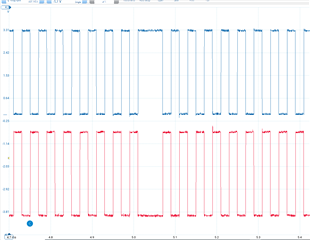Other Parts Discussed in Thread: SYSCONFIG
Hi,
I am running a DC/DC converter with phaseshift control between ePWM1 and ePWM2, 50% duty-cycle with TBPRD=2000 and CMPA=1000.
When loading the phase shift I am missing one PWM cycle everytime TBPHS pass 1000.
ePWM2 looks like:

I have tried to avoid jumping over 1000 but instead increment TBPHS when passing 1000 but that does not make any difference, still missing one cycle.
If the synchronizing pulse comes when TBPHS equals 1001, I thought TBCTR should be at 1000 (last TBPHS value) and set the output high but that doesn't seem to be the case.
The function that sets TBPHS is not running synchronized with TBCTR but it seems to be the same behavior independent of when the TBPHS is set.
Can you enlighten me what I should do or think?


